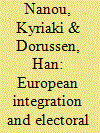| Srl | Item |
| 1 |
ID:
120132


|
|
|
|
|
| Publication |
2013.
|
| Summary/Abstract |
The assignment of policy competencies to the European Union has reduced the divergence of party policy positions nationally, leaving the electorate with fewer policy options. Building upon insights from spatial proximity theories of party competition, the convergence argument predicts convergence particularly in policy domains with increasing EU competence. As the policy commitments that derive from EU membership increase, parties become more constrained in terms of the feasible policy alternative they can implement when in office. The analysis uses manifesto data at the country-party system level for nine policy domains. It uses ordinary least squares (OLS) estimation with country fixed effects, a lagged dependent variable and country corrected standard errors. Controlling for other factors that could plausibly explain policy convergence, the models also assess whether the convergent effect of party positions varies across different types of parties. The main finding is that in policy domains where the involvement of the EU has increased, the distance between parties' positions tends to decrease. The constraining impact of EU policy decisions differs between Member and non-Member States. This effect is more apparent for the policy agendas of larger, mainstream and pro-EU parties in the Member States.
|
|
|
|
|
|
|
|
|
|
|
|
|
|
|
|
| 2 |
ID:
120146


|
|
|
|
|
| Publication |
2013.
|
| Summary/Abstract |
In this article an integrated framework of agenda-setting is proposed that incorporates the two main accounts of agenda-setting: the information-processing approach by Comparative Agenda Project scholars and the preference-centred account advanced by Comparative Manifestoes Project scholars. The study claims that attention allocation is determined at the same time by preferences, information and institutions, and that attention allocation is affected by the interactions between these three factors. An empirical test is conducted that draws upon a dataset of parliamentary questions/interpellations in Belgium in the period 1993-2000. It is found that attention in parliament is indeed driven by preceding party manifestos (preferences), by available information (media coverage) and by institutional position (government or opposition party). The evidence establishes that agenda-setting is also affected by the interactions between preferences, information and institutions. Actors, given their preferences, treat information in a biased fashion, and institutions moderate information's role.
|
|
|
|
|
|
|
|
|
|
|
|
|
|
|
|